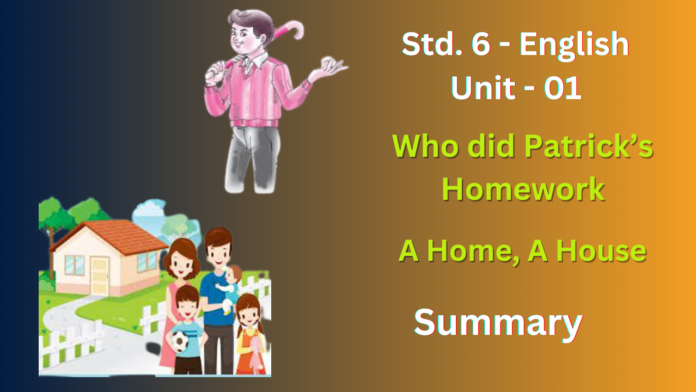NCERT Solutions for Class 6 English Who Did Patrick’s Homework & A home A house
Who did Patrick’s Homework
Here’s a more detailed summary of “Who Did Patrick’s Homework” from NCERT Solutions for Class 6 English:
Patrick’s Homework Woes:
- Patrick hates homework and prioritizes playing over studies.
- His teachers warn him about falling behind and not learning.
- Feeling like an ignoramus (someone who is ignorant), Patrick longs for a way out of homework.
Enter the Elf:
- One day, Patrick rescues a tiny elf from a cat.
- In gratitude, the elf offers to complete Patrick’s homework for a semester (35 days).
- Patrick jumps at the chance to be free of homework.
The Unexpected Twist:
- It seems too good to be true – the elf has no knowledge of school subjects!
- The elf struggles with basic concepts like multiplication tables and needs Patrick’s help.
Patrick’s Hidden Effort:
- To explain things to the elf, Patrick dives into his textbooks and even gets library books.
- He unknowingly starts to understand the concepts himself while teaching the elf.
Success and a Lesson Learned:
- Patrick’s grades improve dramatically, and his teachers are impressed.
- Even his parents notice a positive change in his attitude and tidiness.
- The story cleverly reveals that Patrick, not the elf, did most of the work.
- By explaining and helping the elf, Patrick learned and retained the information himself.
The Underlying Message:
- Shortcuts don’t always lead to true learning or success.
- Putting in the effort, even if through helping someone else, can lead to unexpected benefits.

1. Answer the following questions. (Refer to that part of the text whose number is given against the question. This applies to the comprehension questions throughout the book.)
1. What did Patrick think his cat was playing with? What was it really?
Ans : Patrick thought his cat was playing with a crumpled piece of paper (or ball of paper). In reality, it was a tiny elf.
2. Why did the little man grant Patrick a wish?
Ans : In return for Patrick sparing him from the cat, the tiny man vowed to grant Patrick a single wish.
3. What was Patrick’s wish?
Ans : Patrick wished for the little elf to complete all his homework for the rest of the semester
4. In what subjects did the little man need help, to do Patrick’s homework?
Ans :
- Math: The text mentions Patrick explaining multiplication tables to the elf. This indicates the elf struggled with concepts in math.
- English: The passage talks about Patrick helping the elf with English lessons. This suggests the elf needed assistance understanding English grammar, vocabulary, or assignments.
5. How did Patrick help him?
Ans : Patrick went beyond just explaining. The text mentions him getting books from the library, suggesting he actively sought out additional resources and materials to help the elf grasp the concepts
6. Who do you think did Patrick’s homework— Patrick himself? Give reasons for your answer
Ans : The story highlights Patrick’s good grades and newfound knowledge. It was Patrick himself who actually did all the homework. The elf’s complete lack of understanding about school subjects. He needed Patrick’s help with basic concepts like multiplication tables and English lessons.
WORKING WITH LANGUAGE
A. Fill in the blanks in the sentences below with the words or phrases from the box. (You may not know the meaning of all the words. Look such words up in a dictionary, or ask your teacher.)
(out of luck , mystery , true to his word , chores , semester , between you and me, lookup)
1. Some people find household____a bore, but I like to help at home.
2. Who stole the diamond is still a____
3. This_________________ we are going to have a class exhibition.
4. _______________ , the elf began to help Patrick.
5.Can you__________________ this word in the dictionary?
6.I started early to be on time, but I was_____________________ . There was a traffic jam!
7.She says she’s got a lot of books, but______________________ I think most of them are borrowed.
Ans :
- chores
- mystery.
- semester
- True to his word
- look up
- out of luck.
- between you and me
B. Use the clues given below to complete this crossword puzzle.
Across
- Very tired
- had an angry look on the face
- short trousers
- a fault in a machine that prevents it from working properly
- a small and naughty boy-fairy
Down
- work that must be done every day, often boring
- a basket with a lid
- Have a short, high-pitched cry
Ans :Across
- Weary (Very tired)
- Scowled (Had an angry look on the face)
- Breeches (Short trousers)
- Glitch (A fault in a machine that prevents it from working properly)
- Eif(A small and naughty boy-fairy)
Down
- Chores (Work that must be done every day, often boring)
- Hamper (A basket with a lid)
- Shrieked (Have a short, high-pitched cry)
SPEAKING
A.In the story Patrick does difficult things he hates to do, because the elf pretends he needs help. Have you ever done something difficult or frightening, by pretending about it in some way? Tell your classmates about it.
Or
Say what you feel about homework. (The words and phrases in the boxes may help you.) Do you think it is useful, even though you may not like it? Form pairs, and speak to each other.
For example:
You may say, “I am not fond of homework.”
Your partner may reply, “But my sister helps me with my lessons at home, and that gives a boost to my marks.”
((not) be fond of (not) take to (not) appeal to (not) be keen on
(not) develop a liking for (not) have a taste for)
[support ,assist ,with the aid of ,help be a boon ,give a boost to]
Ans : Here’s an example conversation about homework using the provided phrases:
You: I don’t really take to homework. It can feel like a lot of extra work after a long day at school.
Partner: I can understand that. But my sister helps me with my lessons at home, and that definitely gives a boost to my marks.
You: That’s a good point. Maybe if I had some support with the more challenging subjects, I wouldn’t mind homework as much.
Partner: Exactly! With a little help, homework can be a way to solidify what you learned in class. It can be a boon for understanding.
You: Maybe you’re right. Perhaps I could ask a friend or family member for help with specific subjects I find difficult.
Partner: That sounds like a great plan!
WRITING
A. This story has a lot of rhyming words, as a poem does. Can you write out some parts of it like a poem, so that the rhymes come at the end of separate lines?
For example:
Patrick never did homework. “Too boring,” he said.
He played baseball and hockey and Nintendo instead.
Ans : Here’s a portion of the story rewritten as a poem, incorporating rhyming words:
Patrick hated homework, a dreadful chore,
Always preferred games by the open door.
“Too dull,” he would mutter, with a grumpy frown,
Basketball, hockey, that’s what brought him down.
B. Look at these sentences.
1. “Too boring,” he said.
2. Cleaned his room, did his chores.
When we speak, we often leave out words that can easily be guessed. We do not do this when we write, unless we are trying to write as we speak (as in the story).
So, if we were to write carefully, we would say:
“Homework is too boring,” he said.
He cleaned his room and did his chores.
C. Rewrite the following incomplete sentences carefully, so that the reader does not have to guess what is left out.
1. more and more books
2. too difficult
3. got up late, missed the bus
4. solved the mystery
Ans : Here are the rewritten sentences with missing information filled in:
- The writers and poets read more and more books. (This clarifies who is reading the books.)
- This personal question is too difficult to answer. (This specifies what kind of question is difficult.)
- When I got up late yesterday morning, I missed the school bus. (This clarifies the context of missing the bus.)
- Lord Krishna solved the mystery of life after death. (This specifies who solved the mystery and what the mystery was about.)
D. Look at this cartoon by R.K.Laxman. Read the sentence given below the cartoon. Discuss the following questions with partner.
- What is it about?
- Do you find it funny? If so, why?
- Do you think a cartoon is a serious drawing? Why or why not?
Ans :
- The cartoon centers on a father’s desire to see his child succeed.
- The humorous cartoon portrays a father encouraging his child to work hard in school, while ironically forbidding him to learn about child labor laws.
- A cartoon’s primary purpose might be to entertain us with humor. However, it can also be a powerful tool. By using humor or satire, a cartoon can draw our attention to serious social issues that impact everyone.
NCERT Solutions for Class 6 English A home A house
Poem : A House, A Home
Here’s a more detailed summary of “A home A house” from NCERT Solutions for Class 6 English:
The poem “A Home A House” by Lorraine M.Halli uses contrasting imagery to define the difference between a house and a home.
- House: The poem describes a house as a physical structure built with materials like bricks, stone, wood, and glass. It may have features like a yard, eaves, chimneys, tile floors, and doors.
- Home: The poem suggests that a true home isn’t just a building, but rather the presence of loving family members. It’s built on acts of kindness, sharing, caring, and unselfishness.

Exercise A home A house
WORKING WITH THE POEM
1. Do you agree with what the poet says? Talk to your partner and complete these sentences.
(i) A house is made of________.
(ii) It has______________.
(iii) A home is made by_______.
(iv) It has__________.
Ans :
(i) A house is made of bricks, stone, wood, and glass (or other building materials).
(ii) It has doors, windows, a roof, floors, and maybe a yard, chimney, or eaves.
(iii) A home is made by loving family members (parents, siblings, etc.).
(iv) It has kindness, sharing, caring, and unselfishness.
2. Now complete these sentences about your house and home.
(i) My house is______.
(ii) The best thing about my home is_____.
Ans : Sentence 1:
- My house is a cozy apartment (or big house, bungalow, etc.) in a bustling neighborhood.
- My house is a peaceful cabin nestled in the woods.
Sentence 2:
- The best thing about my home is the big backyard where I can play with my friends.
- The best thing about my home is the warm fireplace where we gather as a family on cold nights.
- The best thing about my home is the feeling of safety and security I feel there.
FAQ’S
Unit – I
Patrick completed his homework on his own. Because the elf was unaware, Patrick dedicated nights to diligent work
Where I get NCERT Solutions for class 6 English Subject.
Education85 provides all the NCERT Solutions for class 6 English Subject
What poetic devices are used in “A Home A House” discussed in NCERT Solutions for Class 6 English?
Poetic devices such as metaphor, imagery, and personification are used to evoke emotions and convey the poem’s message effectively.
What message does the poet convey through “A Home A House” in NCERT Solutions for Class 6 English?
The poet emphasizes that a home is more than just a structure, it is where one finds comfort, security, and a sense of identity.
What are some key lessons from “Who Did Patrick’s Homework?” in NCERT Solutions for Class 6 English?
It teaches about honesty, responsibility, and the value of hard work.


